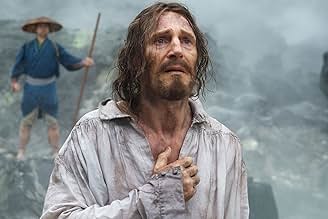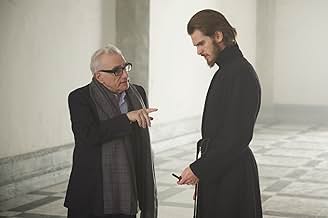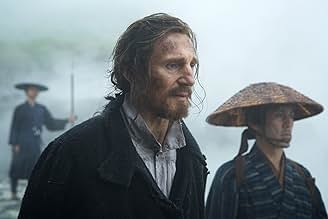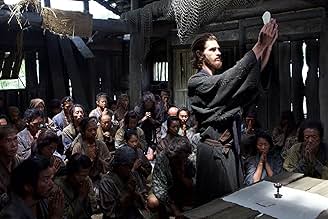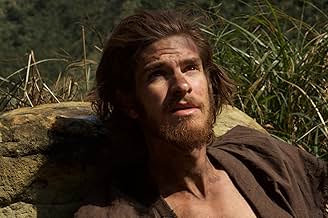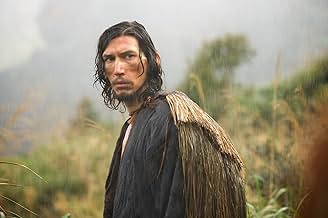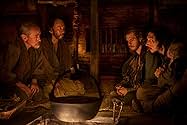Silence
In the 17th century, two Portuguese Jesuit priests travel to Japan in an attempt to locate their mentor, who is rumored to have committed apostasy, and to propagate Catholicism.In the 17th century, two Portuguese Jesuit priests travel to Japan in an attempt to locate their mentor, who is rumored to have committed apostasy, and to propagate Catholicism.In the 17th century, two Portuguese Jesuit priests travel to Japan in an attempt to locate their mentor, who is rumored to have committed apostasy, and to propagate Catholicism.
- Director
- Writers
- Stars
- Nominated for 1 Oscar
- 8 wins & 62 nominations total
Issei Ogata
- Old Samurai
- (as Issey Ogata)
- …
Shin'ya Tsukamoto
- Mokichi
- (as Shinya Tsukamoto)
Yôsuke Kubozuka
- Kichijiro
- (as Yosuke Kubozuka)
Diego Calderón
- Prisoner Augustinian Friar #2
- (as Diego Calderon)
Panta
- Tomogi Villager #1 (Yohei)
- (as PANTA)
- Director
- Writers
- All cast & crew
- Production, box office & more at IMDbPro
Featured reviews
This was Martin Scorsese's passion project. The reason he waited so long was because he didn't feel like he was ready. But when he finally made it, it bombed. Silence is a deconstruction and an examination of faith and spirituality. It's long, patient, quiet, slow. Thus, by the end of the film you will be exhausted. Andrew Garfield gives one his best performances, watching his soul gradually crumble was nothing short of heartbreaking. Adam Driver and Liam Neeson were great as well. Silence is a film not to be played as background noise. It's very hard to watch at points. But if your patient and committed to view it in it's entirety, you'll find something immensely rewarding. Silence is Scorsese's most underrated film, as well as one of the most underrated films of the 21st century.
It begins with a cacophonous medley of environmental sounds, such as crickets chirping, before cutting to absolute silence and the title. And then to a shot of severed heads. Perhaps this is Scorsese adding in some of his signature bits of artistic representations and violence. But what follows is an excruciating exercise in repetition, as faith is tested again and again for nearly three hours, with a relentlessness better reserved for succinct motifs, not heavy-handed, protracted lessons on religious dogmata.
"There's little peace for us now." The progress of spreading Christianity in Japan has been halted by persecution and destruction. The remaining padres have - along with their followers - been brutally murdered. Some even ask to be tortured to demonstrate their faith in God, but the end result is the same.
When a letter reaches Father Valignano (Ciaran Hinds), purporting that one of the strongest of all priests, Father Ferreira (Liam Neeson), has apostatized and taken up a Japanese wife, two young padres refuse to accept such an unequivocal falsity. Resolute in clearing his name, they determine to make the hazardous journey to Japan to find out the truth about Ferreira's whereabouts. Father Garrpe (Adam Driver) and Father Rodrigues (Andrew Garfield) were directly under his tutelage, and so procure a Japanese man, Kichijiro (Yosuke Kubozuka), living in Macao, to aid in their smuggling onto the island.
By 1640, Garrpe and Rodrigues are the last two priests to witness the aftermath of the 20 years of Jesuit persecution in Japan. They make their way to the tiny village of Tomogi before moving on to Goto, where remnants of Christian believers still secretly practice their faith. They must hide during the day and hold mass in the dead of night, always in fear of being found out by the Inquisitor (Issei Ogata), an elderly, somewhat comical man charged with seeking out and eradicating the perceived threat of Christianity.
"Silence" does exhibit stellar performances, especially when it comes to exceptional courage through unshakeable beliefs (Driver being far more convincing than Garfield, in appearance and speech). There are also opportunities for contrasts and fluctuations in adherence to such religious principles, particularly with Kichijiro, who comes to represent many of the failed ideologies mistranslated or misunderstood in proliferating a system so fundamentally alien to many of the formerly Buddhist inhabitants. Doubt also creeps in, as Garrpe grows impatient and Rodrigues questions the illusory habits of a deity that unexplainably remains absent in the most anguishing of times. The two priests, along with most of the villagers, are desperate for tangible signs of faith - signs that occasionally become more valuable than faith itself.
In this perpetual search for validation and proof of God's omniscience, there are numerous sequences of profound conviction, made more striking by the increasing pitifulness of the survivors and the escalation of tortures inflicted on those who refuse to renounce the invading religion. But, correspondingly, in this indulgent, overlong epic of potent morals, where the individualization of religious implications routinely trumps the bigger picture (along the lines of the infuriating yet purposeful justifications seen in "A Man for All Seasons"), there's fleeting entertainment value to be found. It's a historical lecture more than a moving examination of theological unity or human weakness, and surely a plodding series of reiterations on shaping spirituality through pain and fear. It's not quite the "priestsploitation" nonsense that it could have been, but it's nevertheless redundant, light on engaging drama, heavy on physical and psychological trials, and sparse on monumental ideas. Particularly with its finale, "Silence" attempts to think for the audience, so that they don't have to strain to uncover subtle genuineness; religious viewers will certainly interpret various sequences to a greater (or different) degree than those without perspectives comparable to the characters on screen.
"There's little peace for us now." The progress of spreading Christianity in Japan has been halted by persecution and destruction. The remaining padres have - along with their followers - been brutally murdered. Some even ask to be tortured to demonstrate their faith in God, but the end result is the same.
When a letter reaches Father Valignano (Ciaran Hinds), purporting that one of the strongest of all priests, Father Ferreira (Liam Neeson), has apostatized and taken up a Japanese wife, two young padres refuse to accept such an unequivocal falsity. Resolute in clearing his name, they determine to make the hazardous journey to Japan to find out the truth about Ferreira's whereabouts. Father Garrpe (Adam Driver) and Father Rodrigues (Andrew Garfield) were directly under his tutelage, and so procure a Japanese man, Kichijiro (Yosuke Kubozuka), living in Macao, to aid in their smuggling onto the island.
By 1640, Garrpe and Rodrigues are the last two priests to witness the aftermath of the 20 years of Jesuit persecution in Japan. They make their way to the tiny village of Tomogi before moving on to Goto, where remnants of Christian believers still secretly practice their faith. They must hide during the day and hold mass in the dead of night, always in fear of being found out by the Inquisitor (Issei Ogata), an elderly, somewhat comical man charged with seeking out and eradicating the perceived threat of Christianity.
"Silence" does exhibit stellar performances, especially when it comes to exceptional courage through unshakeable beliefs (Driver being far more convincing than Garfield, in appearance and speech). There are also opportunities for contrasts and fluctuations in adherence to such religious principles, particularly with Kichijiro, who comes to represent many of the failed ideologies mistranslated or misunderstood in proliferating a system so fundamentally alien to many of the formerly Buddhist inhabitants. Doubt also creeps in, as Garrpe grows impatient and Rodrigues questions the illusory habits of a deity that unexplainably remains absent in the most anguishing of times. The two priests, along with most of the villagers, are desperate for tangible signs of faith - signs that occasionally become more valuable than faith itself.
In this perpetual search for validation and proof of God's omniscience, there are numerous sequences of profound conviction, made more striking by the increasing pitifulness of the survivors and the escalation of tortures inflicted on those who refuse to renounce the invading religion. But, correspondingly, in this indulgent, overlong epic of potent morals, where the individualization of religious implications routinely trumps the bigger picture (along the lines of the infuriating yet purposeful justifications seen in "A Man for All Seasons"), there's fleeting entertainment value to be found. It's a historical lecture more than a moving examination of theological unity or human weakness, and surely a plodding series of reiterations on shaping spirituality through pain and fear. It's not quite the "priestsploitation" nonsense that it could have been, but it's nevertheless redundant, light on engaging drama, heavy on physical and psychological trials, and sparse on monumental ideas. Particularly with its finale, "Silence" attempts to think for the audience, so that they don't have to strain to uncover subtle genuineness; religious viewers will certainly interpret various sequences to a greater (or different) degree than those without perspectives comparable to the characters on screen.
- The Massie Twins
'Silence' is exactly what you would expect from a Martin Scorsese film in that it is well-produced, written and shot with a strong storyline and engaging lead characters. There aren't many films that explore religion and faith as deeply as this one and there's no doubt that it is an intellectual, thought-provoking piece that Scorsese has created. It's also visually stunning - as a piece of filmmaking 'Silence' is difficult to fault.
It is, however, very easy to fault as a piece of entertainment. For all its technical merit, the truth is that this is an overly long, tediously slow and largely dull film that the average viewer will struggle to sit through. The pacing does it no favours and the near three-hour running length is excessive to say the least. It could have been condensed to closer to the two-hour mark without losing much at all from the storyline.
'Silence' is obviously more likely to appeal to those with religious/spiritual beliefs, and they would probably get a lot more out of this film than I did. A well-crafted film, but rather dull and unrewarding for the average viewer.
It is, however, very easy to fault as a piece of entertainment. For all its technical merit, the truth is that this is an overly long, tediously slow and largely dull film that the average viewer will struggle to sit through. The pacing does it no favours and the near three-hour running length is excessive to say the least. It could have been condensed to closer to the two-hour mark without losing much at all from the storyline.
'Silence' is obviously more likely to appeal to those with religious/spiritual beliefs, and they would probably get a lot more out of this film than I did. A well-crafted film, but rather dull and unrewarding for the average viewer.
In the Seventeenth Century, in Portugal, the Portuguese Jesuit priests Sebastião Rodrigues (Andrew Garfield) and Francisco Garupe[ (Adam Driver) ask permission to Father Alessandro Valignano (Ciarán Hinds) to travel to Japan to investigate the rumors that their mentor Father Cristóvão Ferreira (Liam Neeson) had committed apostasy abandoning his Catholic faith after being tortured by the shogunate. They meet the alcoholic fisherman Kichijiro (Yosuke Kubozuka) that agrees to guide them to Japan. When they arrive at a small village, they learn that the Christians residents live hidden in caves since the Inquisitor kills any villager suspect to be Christian. Along the days, Rodrigues and Garupel propagate Catholicism among the villagers and try to find a lead to Ferreira. But when the Inquisitor arrives in the village with his men, the live of the residents and the priests will change.
"Silence" is a film directed by Martin Scorcese that shows how cruel a man can be. Based on historical facts, "Silence" show the powerful Shogunate defending their religion and culture against the European Catholicism that promises easy paradise to the suffered Japanese workers that has to work lot to pay the taxes and survive. The result is a good, but too long and tiresome film. My vote is seven.
Title (Brazil): "Silêncio" ("Silence")
"Silence" is a film directed by Martin Scorcese that shows how cruel a man can be. Based on historical facts, "Silence" show the powerful Shogunate defending their religion and culture against the European Catholicism that promises easy paradise to the suffered Japanese workers that has to work lot to pay the taxes and survive. The result is a good, but too long and tiresome film. My vote is seven.
Title (Brazil): "Silêncio" ("Silence")
To this day, Martin Scorsese remains my all-time favourite director, a man whose approach to cinema completely differs to others in Hollywood, his appreciation towards cinema as an art form is his finest quality in what makes him arguably the greatest film director around. With 'Silence' promoted as Scorsese's 20-year passion project, it was a film I couldn't resist seeing, the legend back behind the camera focusing on a subject not fully studied in cinema, a subject that's mostly misunderstood.
I want to start with my conclusion and go from there. 'Silence' won't be everybody's film, the same way other ambitious films like 'The Revenant' or 'The Tree of Life' weren't, however despite my respect to Scorsese's mastery and level of detail, in my own honest opinion I believe this film fell short due to the lack of insight into it's main theme and thus instead transformed into a slow and somewhat dreary tale that arguably didn't need it's near 3-hour running time to tell its tale.
Now don't get me wrong, in regards to the film's craft it is a masterpiece, the cinematography is raw and epic, the direction from Scorsese is phenomenal and the set design is gorgeous. Accompanying this are a series of fine performances, most notably from Andrew Garfield who should receive monumental praise for his role, I haven't seen such a visceral performance in years, the raw emotion is uncanny. But unfortunately the technicalities and craft can't cover up the flaws that lie in the running time and the tediously slow plot that didn't want to end.
If there's anything I can leave you with from this review to help you decide as to whether it's a worthy watch or not, let me just say this: 'Silence' isn't a piece of entertainment, it's instead an experience; and whilst a technically masterful one at that, many audience members may find themselves slowly drifting off to sleep - as my neighbour in the cinema did. It isn't really a case of liking it or disliking it, it's more a case of the adventure, and despite my partial disappointment with it, the adventure was more than worthy enough for the viewing. Scorsese is still an exquisite auteur, flaws or not.
I want to start with my conclusion and go from there. 'Silence' won't be everybody's film, the same way other ambitious films like 'The Revenant' or 'The Tree of Life' weren't, however despite my respect to Scorsese's mastery and level of detail, in my own honest opinion I believe this film fell short due to the lack of insight into it's main theme and thus instead transformed into a slow and somewhat dreary tale that arguably didn't need it's near 3-hour running time to tell its tale.
Now don't get me wrong, in regards to the film's craft it is a masterpiece, the cinematography is raw and epic, the direction from Scorsese is phenomenal and the set design is gorgeous. Accompanying this are a series of fine performances, most notably from Andrew Garfield who should receive monumental praise for his role, I haven't seen such a visceral performance in years, the raw emotion is uncanny. But unfortunately the technicalities and craft can't cover up the flaws that lie in the running time and the tediously slow plot that didn't want to end.
If there's anything I can leave you with from this review to help you decide as to whether it's a worthy watch or not, let me just say this: 'Silence' isn't a piece of entertainment, it's instead an experience; and whilst a technically masterful one at that, many audience members may find themselves slowly drifting off to sleep - as my neighbour in the cinema did. It isn't really a case of liking it or disliking it, it's more a case of the adventure, and despite my partial disappointment with it, the adventure was more than worthy enough for the viewing. Scorsese is still an exquisite auteur, flaws or not.
What Scorsese Film Ranks Highest on IMDb?
What Scorsese Film Ranks Highest on IMDb?
Cinema legend Martin Scorsese has directed some of the most acclaimed films of all time. See how IMDb users rank all of his feature films as director.
Did you know
- TriviaAdam Driver lost 50 pounds for the role; 30 before filming, and 20 during filming.
- GoofsIn the scene where Rodrigues and his Translator meet Garupe on the beach, Just after Garupe jumps into the ocean and starts to swim, The Translator is saying dialogue but his lips are not moving for most of the spoken line, and what is spoken does not match his lip movements.
- Crazy creditsThere was no music during the closing credits. The music was replaced by the sounds of the sea, a storm and the sounds of nature. This is in keeping with the deep ties Japan has with nature.
- ConnectionsFeatured in Roeper's Reviews: Richard Roeper's Top 16 Films for 2016 (2016)
- SoundtracksFrancesco's Cosmic Beam Experience (live, Marina Del Rey)
Composed and performed by Francesco Lupica
- How long is Silence?Powered by Alexa
Details
- Release date
- Countries of origin
- Official sites
- Languages
- Also known as
- Silencio
- Filming locations
- Production companies
- See more company credits at IMDbPro
Box office
- Budget
- $46,000,000 (estimated)
- Gross US & Canada
- $7,100,177
- Opening weekend US & Canada
- $130,880
- Dec 25, 2016
- Gross worldwide
- $23,834,809
- Runtime2 hours 41 minutes
- Color
- Sound mix
- Aspect ratio
- 2.35 : 1
Contribute to this page
Suggest an edit or add missing content








